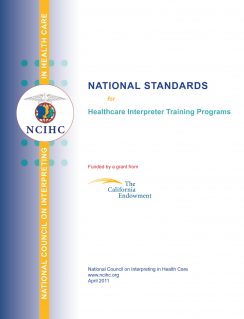In support of the “Official Launch of the National Standards for Healthcare Interpreter Training Program by the National Council on Interpreting in Health Care (NCIHC)”
The official launching of the National Standards for Healthcare Interpreter Training Program (the national training standards) by the National Council on Interpreting in Health Care (NCIHC) was
presented during the NCIHC annual membership meeting May 2011 in New Orleans. The NCIHC Standards, Training and Certification Committee (STC) have been working on the final product for several years beginning with the initial core research and literature review conducted through focus groups, during NCIHC membership meetings, etc. As a result of the extensive research and literature review, national interpreter task analyses was performed in order to effectively and thoroughly identify interpreters’ “body of knowledge,” such as role, duties, skills, knowledge, training, etc. Once the
information was collected, the STC formed an advisory committee of experts in the field to begin drafting standards. In 2010, STC began to solicit feedback to ensure a thorough understanding of interpreter trainings at the national level and to again analyze the feedback. Next, the draft was
revised, proofread and published.
According to the STC, the national training standards are intended to provide a basis and a foundation for interpreter training programs. The NCIHC national training standards are intended to enhance, guide and provide a working tool for interpreter
training programs. However, STC does recognize that many interpreter training programs already have many of the recommended components in place while other training programs may be missing some of the recommended national interpreter training elements.
The training standards are divided into three (3) sections:
I. Program Content Standards
(knowledge and interpreting skills),
II. Instructional Methods Standards
III. Programmatic Standards
The Program Content Standards begins with a breakdown of what knowledge and skills professional interpreters should be introduced to during interpreter training programs. Included in the Knowledge and Skills sections are:
A. Knowledge
1. The healthcare interpreting profession, i.e.,
a. Definition of interpreting (vs. bilingualism, translation)
b. Fields of interpreting (community interpreting, diplomatic interpreting, medical interpreting, etc.)
c. How interpreters are employed (dedicated, dual-role, contract, freelance, etc.)
d. An overview of healthcare interpreting history in the U.S.
e. Purpose, function and responsibilities of healthcare interpreters
f. Modes of interpreting in healthcare (consecutive, simultaneous, sigh translation),
g. Venue of interpreting (face to face, remote, etc.)
h. Relevant laws, standards, Official Launch of the National Stardards for Healthcare
